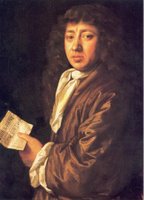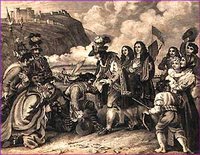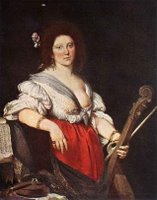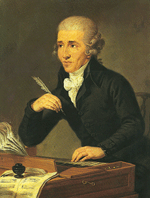
After the recent, and very untimely death of a dear friend, it was related by another friend the day after her memorial service, that she had never settled on a 'career' per se, as she had so many interests. She just wanted to be a dilettante...meaning it in the positive sense...and explore many fields. I nearly launched into a lecture then and there, but my added years have taught me the wisdom of saying little or nothing, when saying much would be inappropriate(sometimes, of course, I still blather on and on).
 Dilettantism has become a slur in modern English, and indeed in other European languages...as far as I know them. Most dictionaries today define it as a broad but shallow knowledge of a subject, i.e...a know-it-all who cannot actually do any of it (whatever it happens to be). I knew that the earlier meaning was not nearly so perjorative, but looked it up anyway in my 1865 Italian dictionary. Dilettante comes from the verb dilettare, meaning to take delight (in something). It was defined as 'one who studies the fine arts, or something similar, merely for the delight, or enjoyment of them, rather than to earn money from either the practice or the teaching thereof' (translation mine). Diletto, the noun, means either delight, or beloved.
Dilettantism has become a slur in modern English, and indeed in other European languages...as far as I know them. Most dictionaries today define it as a broad but shallow knowledge of a subject, i.e...a know-it-all who cannot actually do any of it (whatever it happens to be). I knew that the earlier meaning was not nearly so perjorative, but looked it up anyway in my 1865 Italian dictionary. Dilettante comes from the verb dilettare, meaning to take delight (in something). It was defined as 'one who studies the fine arts, or something similar, merely for the delight, or enjoyment of them, rather than to earn money from either the practice or the teaching thereof' (translation mine). Diletto, the noun, means either delight, or beloved. Throughout the Renaissance and Baroque periods, the beaux arts were filled with amateurs, who honed their crafts to a high pitch...not to make money..rather because the ability to write, sing, play, paint, compose, speak languages, etc., was regarded as an essential accomplishment of the well-rounded lady or gentleman. Some of these men and women, prohibited by their class from taking money for their creative efforts, nevertheless achieved proficiency equal to or surpassing many of their professional contemporaries. It must be said that the dilettanti were all of the middle and upper classes, as to be a professional in the arts (less so in literature) was viewed as scandalous and immoral. Probably because most professional artists were--frankly--scandalous and immoral, judged by the norms of their day.
Throughout the Renaissance and Baroque periods, the beaux arts were filled with amateurs, who honed their crafts to a high pitch...not to make money..rather because the ability to write, sing, play, paint, compose, speak languages, etc., was regarded as an essential accomplishment of the well-rounded lady or gentleman. Some of these men and women, prohibited by their class from taking money for their creative efforts, nevertheless achieved proficiency equal to or surpassing many of their professional contemporaries. It must be said that the dilettanti were all of the middle and upper classes, as to be a professional in the arts (less so in literature) was viewed as scandalous and immoral. Probably because most professional artists were--frankly--scandalous and immoral, judged by the norms of their day. Today, many of these genteel amateurs are very highly regarded. Michel de Montaigne, Elizabeth I of England (sometimes tipped as the real Shakespeare), Samuel Pepys, the diarist, whose participation in the literary, political, and musical circles of Restoration London are one of the richest sources of that period...all because he was dilettantishly interested in everything. Barbara Strozzi, for my money the greatest female composer ever, almost never performed (she was a great virtuosa singer) outside of private settings, and had her own compositions published under subscription. Much of the chamber music of Baroque greats such as Scarlatti, Handel, and Steffani was written for and performed by wealthy and/or noble amateurs who, through their fees funded the existence of many an independant (no court or church position) composer.
Today, many of these genteel amateurs are very highly regarded. Michel de Montaigne, Elizabeth I of England (sometimes tipped as the real Shakespeare), Samuel Pepys, the diarist, whose participation in the literary, political, and musical circles of Restoration London are one of the richest sources of that period...all because he was dilettantishly interested in everything. Barbara Strozzi, for my money the greatest female composer ever, almost never performed (she was a great virtuosa singer) outside of private settings, and had her own compositions published under subscription. Much of the chamber music of Baroque greats such as Scarlatti, Handel, and Steffani was written for and performed by wealthy and/or noble amateurs who, through their fees funded the existence of many an independant (no court or church position) composer. Joseph Haydn, in the employ of the Esterhazy family in Austria, was the most famous composer in Europe. He, needing none of the patronage of other nobles, still entrusted the premier of his favorite vocal composition (and indeed his masterpiece) Arianna a Naxos to the repeated performance of various singing girls in and around Vienna, before playing it himself in its professional debut with the great castrato, Pacchierotti, in London. The inability of a certain amateur composer to deliver, on the other hand, may have given us Mozart's Requiem. The gentleman in question commissioned the work, allegedly, in the intention of passing it off as his own. Mozart died, however, before he could finish it. The work was probably finished by his student, Süssmeyer (which is why the ending is so disappointing after the first 35 or 40 minutes of brilliance), and never delivered to the mystery nobleman.
Joseph Haydn, in the employ of the Esterhazy family in Austria, was the most famous composer in Europe. He, needing none of the patronage of other nobles, still entrusted the premier of his favorite vocal composition (and indeed his masterpiece) Arianna a Naxos to the repeated performance of various singing girls in and around Vienna, before playing it himself in its professional debut with the great castrato, Pacchierotti, in London. The inability of a certain amateur composer to deliver, on the other hand, may have given us Mozart's Requiem. The gentleman in question commissioned the work, allegedly, in the intention of passing it off as his own. Mozart died, however, before he could finish it. The work was probably finished by his student, Süssmeyer (which is why the ending is so disappointing after the first 35 or 40 minutes of brilliance), and never delivered to the mystery nobleman. The most famous Americans of the Revolutionary period were almost all dilettantes in one fashion or another. Benjamin Franklin, trained as a printer, was also an inventor, author, politician, and civic reformer. Thomas Jefferson, trained in law, was one of the greatest writers of English prose, a talented amateur violinst, agricultural reformer, architect, and viticulturalist. And Boston tanner William Billings, with one eye, one good leg, and arms of unequal length, was the self-taught composer of the Revolution, writing the great marching song, Chester, as well as the first masterpiece of American music, When Jesus Wept.
The most famous Americans of the Revolutionary period were almost all dilettantes in one fashion or another. Benjamin Franklin, trained as a printer, was also an inventor, author, politician, and civic reformer. Thomas Jefferson, trained in law, was one of the greatest writers of English prose, a talented amateur violinst, agricultural reformer, architect, and viticulturalist. And Boston tanner William Billings, with one eye, one good leg, and arms of unequal length, was the self-taught composer of the Revolution, writing the great marching song, Chester, as well as the first masterpiece of American music, When Jesus Wept. But in the 18th century things began to change. Jane Austen often mocked the 'accomplishments' of young ladies as pretentious, pedantic and shrill (who can forget Mary Bennett's domination of conversations and premeditated assaults upon unoffending fortepianos?). The popular taste began to shift towards allowing professionals to do something well, rather than the (often mistaken) impression of an amateur performance being, of necessity, a poor performance. The Romantic artists helped this impression along, creating the cult of 'artiste' as a rarified, suffering individual floating far above the plane of ordinary, mortal existence.
But in the 18th century things began to change. Jane Austen often mocked the 'accomplishments' of young ladies as pretentious, pedantic and shrill (who can forget Mary Bennett's domination of conversations and premeditated assaults upon unoffending fortepianos?). The popular taste began to shift towards allowing professionals to do something well, rather than the (often mistaken) impression of an amateur performance being, of necessity, a poor performance. The Romantic artists helped this impression along, creating the cult of 'artiste' as a rarified, suffering individual floating far above the plane of ordinary, mortal existence.This worship-and-adore-me-from-afar arrogance was cultivated by artists such as Paganini, Byron (who mocked amateur friends when they waxed poetical), Liszt, and seminally, by Goethe, whose Sorrows of Young Werther in 1775 created the image of the fatuous, self-involved, modern artist. One of the great scandals in Anne Brontë's Tenant of Wildfell Hall is that the young lady has the temerity to make a living from selling her paintings. In Wilkie Collins' No Name, the degredation of the younger daughter is complete when she goes onto the stage to earn money, after her parent's death. And Edith Wharton's snide The Dilettante speaks for itself.
 Searching the web the last few days under the word dilettante, I came up with a depressingly large number of scurrilous definitions, as per the one at the top of this collumn, and a lot of half shame-faced, half defiant personal blogs, making fun of themselves as jacks-of-all-trades, and masters of none. But it is the blogosphere itself which gives me hope that the 17th and 18th century understanding of dilettante is coming back into fashion. For what are bloggers but modern-day dilettantes? Almost always without direct specialized education, they boldly dive into all conceivable topics...like modern day Montaignes. Interest and competence seem to once again matter, rather than a specific University degree, or a years-long apprenticeship. I would like to place myself proudly in the category of the modern dilettanti, were I so assured that I was competent in anything outside of my own profession (ironically: the arts).
Searching the web the last few days under the word dilettante, I came up with a depressingly large number of scurrilous definitions, as per the one at the top of this collumn, and a lot of half shame-faced, half defiant personal blogs, making fun of themselves as jacks-of-all-trades, and masters of none. But it is the blogosphere itself which gives me hope that the 17th and 18th century understanding of dilettante is coming back into fashion. For what are bloggers but modern-day dilettantes? Almost always without direct specialized education, they boldly dive into all conceivable topics...like modern day Montaignes. Interest and competence seem to once again matter, rather than a specific University degree, or a years-long apprenticeship. I would like to place myself proudly in the category of the modern dilettanti, were I so assured that I was competent in anything outside of my own profession (ironically: the arts).I think it's time that we, in regarding the dilettanti, discard 'dilatory', and go back to 'diletto'...delight, beloved.
Escutcheon Blot...amateur writer, painter, and pontificator.








.jpg)






10 comments:
Amen brother! I think this wonderful post goes a long way towards rescuing this maligned word. I want to be a Dilettante with you! As I was reading this, questions kept arising in my mind only to be answered by the next paragraph. You're way ahead of me, especially on that Blogger stuff. Next can we rescue "amateur"?
Wagstaff,
Do you mean you disagree about the blogger comparison, or agree, but hadn't thought of it, or just hadn't thought of it?
Or hadn't though of it, but upon mature and quiet reflection, find it a bunch of bull? (Not my favorite option, incidentally)
I don't know about amateur. I used (and use) the terms interchangeably. There has still got to be some word of damnation for incompetent yet overly self-congratulatory efforts--in whatever the medium. I'm just not sure what that word is.
But there sure is a lot of undeserved self-esteem floating around nowadays.
And I am not sure I am good enough to be what I would consider a proud dilettant. I am just not getting paid. And I am not particularly genteel, to boot.
I've always been bothered by the evolution of "Dilettante" into a derogatory term, and therefore must add my voice to the choir or praise here.
To me this mindset is not just an outgrowth of the mentality of an artist as one in a position outside the norm, and therefore better than such, but also stems from the (to my mind) asinine Calvinist thinking that underlies the phrase "That person has too much time on their hands."
As far as a term that could still be used for "incompetent yet overly self-congratulatory" efforts... perhaps "pretentious"?
Reference.com lists the following for one of the definitions of pretentious:
"Claiming or demanding a position of distinction or merit, especially when unjustified."
That covers a lot of stuff that has been dubbed both amateur and professional, in my humble opinion.
a very thoughtful and thourough essay, I don't see anything lacking to contribute to the dialogue.
perhaps to provide another example: Andy Warhol. Mr. Warhol has been an inspiration to many, not just because of his paintings.
He also made sculpture, films, photographs, wrote books, created a magazine, collaborated with fashion designers and he even had a TV show on MTV for a short time before his death. I think a lot of artists see it as helpful to have an interest or understanding of a variety of mediums, and not just one.
The word that I am disappointed to see becoming 'dirty' is 'liberal'.
Merriam Webster says it means 'favorable to progress or reform' (in political affairs). and 'favorable to personal freedoms and civil liberties'. 'favorable to personal belief'. 'free from prejudice or bigotry'. 'open-minded or tolerant'. 'generosity'.
wow. I wasn't expecting a heavy political meaning in it, but that is the first definition. I was expecting the 'large amount' definition to be first, as in "A liberal application of WD-40"
I guess it helps define those who disagree with 'liberals'.
Charlie,
I fear that the words 'liberal' and 'conservative' are two more victims of Linguistic Creep(and I don't mean Noam Chomsky).
A liberal, in the political sense, used to mean, and still does in Europe, a non-judgemental, socially open, economically laissez-faire, small government philosophy. best exemplified by Thos. Jefferson's "The government that governs best, governs least".
I am afraid that Canadian and American 'Liberals' fit no more this definition(would that they did!) than American Conservatives(Stephen Harper is too new to judge him yet) fit the definition of financially responsible, cautious and sober realists.
In Europe the word 'liberal' has also become an epithet, delivered with the same verve and vigour previously reserved for neo-nazis. The French are especially prone to this sort of ad hominem attack..."Anglo-Saxon Neo-Liberal Imperialist"(pfui pfui pfui).
Read the Wagstaff Manifesto for a classical liberal...in my opinion, or try searching The 19th century British PM William Gladstone...the original liberal.
Ciao
I can honestly say that I've never given much thought to the dilettante argument. I have apparently been unaware of the derogatory usage, as I have always thought of it as a good, if not haphazard, thing to be. It's not that I haven't heard it used that way, but in my ignorance I have mistaken their meaning for a positive one. I am envious of the modern day dilettantes I have met. The ability and opportunity to study new interests is one I wistfully admire. Hurrah, for the dilettantes in this world.
Hey EB, sorry to be late getting back to this thread – I’ve been on the road. To clarify what I meant earlier: I do agree with what you said about the blogosphere. I thought of some of it but not all of it. The truth is I was tipped off early as to the premise of your post, so I was already thinking about what I could add to it. By the time I actually read it, I saw that you covered any and all bases that I could think of, plus much more that I hadn’t thought about. The only other question I have concerns a barely articulated notion I had about Patronage. Is it possible that, along with this new upsurge of Dilettantism fostered by computers, there could be some new incarnation of the system of Patronage, or was that practice so married to the concept of Aristocracy that it has gone in the dustbin of history with it? I also agree that we still need an “amateur” word with derogatory connotations, and Steve’s nominee, “pretentious” fits nicely.
On a side note, I notice that EB has filled out his Blogger profile,and I am thrilled to see Anthony Trollope represented. I so adored The Warden; I can’t tell you how much. It’s my favorite novel that I’ve read in the last five years. I’m only two books into the Barsetshire series, and I haven’t read any Palliser novels yet, but I’ve been collecting them, and just seeing these unread novels on my shelf is pleasing to contemplate.
I am afraid that the concept of patron of the arts is likely to remain(in ever decreasing numbers), what it now is, rather than what it was 200 years ago.
In earlier times, the patrons WERE the dilettantes. These composers about whom I spoke were hired by wealthy dilettantes to teach them and to compose new works for them. Amateur painters and writers would fund publications or exhibits for more professional ones. I have always felt that those who understand best what a professional artist has achieved, or can achieve, are those who already possess at least of a modicum of skill in those areas.
The dilettantes of today are those who have enough leisure time, and the concomitant income, to pursue their delight. In short, a dilettante must be his own patron. If he then wishes to sponser a professional, more power to him. One of my points, poorly stated, I admit, was to have been that the professional arts would have floundered badly without the sponsorship and support, and often participation of the dilettante.
I have a hard time imagining the idle wealthy of today spending the time it takes to, for example, learn to play the piano. In earlier days, one had to fill one's time with something. No TV, no movies. Books(before 1800) expensive and rare, and mostly boring. If you wanted music you made it yourself, or hired it.
I have been trying to picture Paris Hilton--American Aristocrat--as a well-educated dilettante and patroness of the arts.
'nuff said.
Paris Hilton: American Aristocrat.
a well-educated media dilettante and patroness of popular culture.
I love this post. I have referred to it in my blog:
"Disclosures of a Dilettante: Defending my honor.:
http://www.joanne-young.blogspot.com
Post a Comment